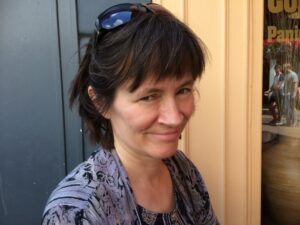University of Oxford
11a Mansfield Rd
OX1 3SZ
UK

Helen Newing
Background
I have a mixed disciplinary background, with a BSc in zoology and psychology from the University of Reading and a PhD in antelope ecology from the University of Stirling. After my PhD I worked for five years in the NGO sector, including with WWF (on project implementation) and Oxfam (on global environmental policy) and then joined the Durrell Institute of Conservation and Ecology at the University of Kent as a lecturer in conservation social science. I stayed there for 16 years. During that time my research was principally on collaborative wildlife management, the role of traditional ecological knowledge, and methods and research paradigms in the emerging discipline of conservation social science. I also introduced and directed an interdisciplinary Masters programme in conservation and rural development. Based on many years of teaching methods in mixed postgraduate classes the brought together students from conservation and from anthropology, I published a textbook on conservation social science methods and approaches, which remains the standard text in this field.
After leaving Kent I returned to the NGO sector, working as a freelance consultant. I joined ICCS in 2018 and since then I have focused on two areas: conservation and human rights, and voluntary standards for socially responsible production of tropical agricultural commodities (especially palm oil). I also remain passionate about building social science skills in the conservation sector, especially on qualitative and participatory methods and approaches.
Research Interests
My principal research interests as as follows:
People-centred approaches to conservation. Specific themes on which I have worked include:
- Collaborative and participatory approaches to natural resource management;
- Conservation and rights perspectives;
- Protected areas governance, especially Indigenous and Community Conserved Areas (ICCAs);
- The role of local communities in voluntary environmental and social standards.
Interdisciplinary approaches to conservation.
At a theoretical level I am very interested in the nature of interdisciplinarity and the processes by which new disciplines emerge and evolve (especially the emerging discipline of conservation science). More practically I am passionate about the need to build social science skills and understanding in the conservation sector and to develop cross-disciplinary understanding, not only with natural scientists but also with social scientists working in the development sector.
Projects
Current
Embedding and scaling up the contributions of indigenous peoples and local communities to conservation and sustainable use: towards transformative change (2022-2028)
Past
Application of the High Conservation Value (HCV) approach at landscape and jurisdictional scales: development of global guidance. High Conservation Value Research Network (HCVRN). (https://www.hcvnetwork.org/)
Social Requirements for the High Carbon Stock Approach (HCSA). Forest Peoples Programme (FPP) (http://www.forestpeoples.org/en/about)
Selected Publications
Newing, H., Fisher, M., Brittain, S., Kenrick, J., & Milner-Gulland, E. (2023). How can we advance equitable, rights-based conservation? Oryx, 57(3), 273-274. https://doi:10.1017/S0030605323000418
Smallhorn-West, P., Allison, E., Gurney, G., Karnad, D., Kretser, H., Lobo, A. S., Mangubhai, S., Newing, H., Pennell, K., Raj, S., Tilley, A., Williams, H., & Peckham, S. H. (2023). Why human rights matter for marine conservation [Policy and Practice Reviews]. Frontiers in Marine Science, 10. https://doi.org/10.3389/fmars.2023.1089154
Newing, H. (2021). Biodiversity and finance: building on common ground with customary rights-holders. Briefing paper. Forest Peoples Programme. https://www.forestpeoples.org/en/convention-biological-diversity-cbd/briefing-paper/2021/biodiversity-and-finance-building-common
Brittain, S et al. 2021. Conservation and the rights of Indigenous peoples and local communities: looking forwards. Oryx 55(5): 641-642. DOI: https://doi.org/10.1017/S0030605321000946
Lan Mei, Helen Newing, Oda Almås Smith, Marcus Colchester and Angus McInnes. 2022. Identifying the Human Rights Impacts of Palm Oil: Guidance for Financial Institutions and Downstream Companies. Forest Peoples Programme. https://globalcanopy.org/wp-content/uploads/2022/08/FPP-Palm-Oil-Report-FINAL52.pdf
Newing, H., & Perram, A. (2019). What do you know about conservation and human rights? Oryx, 53(4), 595-596. doi: https://doi.org/10.1017/S0030605319000917
Mbidzo, M.; Newing, H.; Thorn, J.P.R. Thorn 2021. Can Nationally Prescribed Institutional Arrangements Enable Community- Based Conservation? An Analysis of Conservancies and Community Forests in the Zambezi Region of Namibia. Sustainability 131 (19): 10663. https://doi.org/10.3390/su131910663
Milner-Gulland et al. 2021. Four steps for the Earth: mainstreaming the post-2020 global biodiversity framework. One Earth. DOI: https://doi.org/10.1016/j.oneear.2020.12.011
Humphreys, D., et al (2019). SDG 17: Partnerships for the Goals – Focus on Forest Finance and Partnerships. In P. Katila, et al (Eds.), Sustainable Development Goals: Their Impacts on Forests and People (pp. 541-576). Cambridge: Cambridge University Press. https://www.cambridge.org/core/books/sustainable-development-goals-their-impacts-on-forests-and-people/5FA75743F80CCE33751BD2095E5754DC
Newing, H.S. 2010. Bridging the gap: interdisciplinarity, biocultural diversity and conservation. Pp 23-40 in: Pretty, J and Pilgrim, S. Eds. Nature and Culture: Rebuilding lost connections. Earthscan. 17 pages. ISBN 978-1-84407-821-9.
Newing, H.S. 2010. Interdisciplinary training in environmental conservation: definitions, progress and future directions. Environmental Conservation 37(4): 410-418. https://doi.org/10.1017/S0376892910000743
Newing, H. 2009. Traditional knowledge in international forest policy: contested meanings and divergent discourses. Journal of Integrative Environmental Research. 6(3): 175 — 187. https://doi.org/10.1080/19438150903090491
Newing, H. 2011. Conducting Research in Conservation: A Social Science Perspective. Routledge. 376 pages. https://www.amazon.co.uk/Conducting-Research-Conservation-Newing-2010-10-13/dp/B01K0RC488
Supervised PhD Projects
Meed Mbidzo (2016): Co-management of wildlife and forestry resources in Namibia: Implications for governance, livelihoods and natural resource management.
Erika Ikemoto (2016): Agroforestry, innovation and protected areas in the Brazilian Amazon.
Constanza Monterrubio (2015): Community Conserved Areas versus Private Protected Areas: differences in policy and practical implications for communities and biodiversity conservation.
Olivia Swinscow-Hall (2012): Navigating moral dilemmas: participatory development among the egalitarian BaAka of the Central African Republic. (ESRC CASE studentship with Forest Peoples’ Programme).
Emily Caruso (2012): Being at the Centre: Self and Empire among Ene Ashaninka People in Peruvian Amazonia. (ESRC CASE studentship with Rainforest Foundation UK).
Laura Penn (2005): An exploration of zoo theatre’s contribution to the directives of zoos: a case study from the Central Park Zoo in New York.
